
*
The national tour of The Addams Family, the Broadway musical inspired by the macabre characters of cartoonist Charles Addams, launched Sept. 15-24 in New Orleans, a city known for its above-ground crypts and mossy, ancient cemeteries. It's now coming to light that what the producer and creative team unleashed on the haunted Louisiana city — and now in cities beyond — is not the current Broadway property, but a new, undead, refreshed, Frankenstein-monster of a musical comedy with a new central plot conflict, new or revised or reordered songs to replace old ones, fresh orchestrations and dance where necessary, and perhaps a little more sexual chemistry than audiences got in the critically dismissed 2010 Broadway version that first starred Bebe Neuwrith as Morticia and Nathan Lane as Gomez.
THE SQUID HAS LEFT THE BUILDING
For the record, the bizarre Act Two love song, "In the Arms," sung by a visitor to the Addams mansion following a sexual encounter with a giant squid, has been cut — no tentacles, no suction-cup marks, no ooze, no reference at all. You can find the squid (a creation of the puppeteer Basil Twist) still working its weird magic in the Broadway version, but after the show closes Dec. 31 at Broadway's Lunt-Fontanne Theatre, the squid will be theatrical calamari — the future Addams script and score for international productions and stock and amateur licensing will reflect the squid-free 2011 tour.
"The squid is gone," lead producer Stuart Oken told Playbill.com in an interview in a New Orleans café the morning of Sept. 23, the official opening date there. Director Jerry Zaks, who had stepped in as "creative consultant" for the Broadway-bound show in late 2009, after the Chicago tryout, reshaping the work for the March 2010 Broadway opening, shared the café table. Zaks now has the touring credit "Entire Production Under the Supervision Of." The squid, Zaks said with a laugh, "was a whimsical notion, and you had to really travel a distance to embrace it."
| |
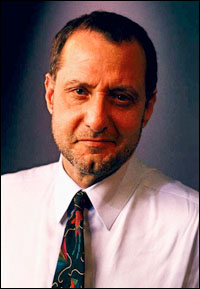 |
|
| Stuart Oken |
Oken said, "I just want to say, when we were working on it in workshop form, in the imagination of what that might have been theatrically — with Terry Mann [as patriarch Mal Beineke] standing up not in squid pockmarks but just as a leading man and singing a big towering song that was kind of satiric about what happened — there was something 'Addams delightful' about it. But then when we saw it there and…had this freakin' squid on stage… it didn't work. We had this squid on stage, and, we couldn't redesign it! What were we going to do?"
"And," Zaks interjected, "we didn't have the inspired idea of what to replace it with. We knew, clearly, that their visit to the Addams household has resulted in chaos for them. The rules of their relationship, which has been undisturbed for years, got tossed on its head, and that's the way we chose to resolve it."
Zaks added that the placement of the "squid song" ultimately felt like an 11-o'clock number, which was wrong for the show — it's called The Addams Family, not The Beineke Family.
| |
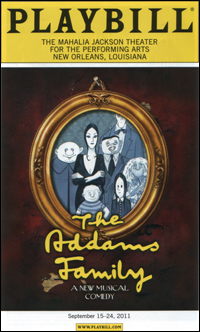 |
|
| Playbill cover for the tour's recent New Orleans engagement. |
"In the Arms (of a Squid)" was emblematic of issues that the creative team faced in the time between the Chicago run in late 2009 and the March 2010 Broadway opening. The clock was ticking. How fast could the team sharpen their storytelling before their opening-night deadline?
Zaks, a four-time Tony Award winner for his direction for Guys and Dolls, Lend Me a Tenor, The House of Blue Leaves and Six Degrees of Separation, was brought in to look at the production during it tryout in Chicago. "We had kind of a creative breakdown coming out of Chicago," Oken explained. "There was a controversy inside our company. There was a need of a change of leadership. When that happens, it's like a shockwave goes through the system, and what Jerry was able to do between Chicago and New York was come in and stabilize, and bring out the best of what we had working for ourselves with some additional changes — but not the kind of work that he was able to do when he was able to step back, and have time, and get the creative team to…reduce anxiety and go back into an authentic process."
Zaks and Oken said that the production's departments were not properly talking to each other under the guidance of original director Phelim McDermott, who is acclaimed for his work on the macabre, visually potent Shockheaded Peter, created with designer Julian Crouch, who was his directing/design partner on The Addams Family. (Oken hired them, and their shared title-page credit was Directed and Designed by Phelim McDermott & Julian Crouch.)
Oken said, "Nobody sets out to do anything other than really good work, and even with the original directors I hired, I hired them believing that their ambitions — married to Rick, Marshall and Andrew's theatrical savvy and experience — were going to take us somewhere special. And, we augured to be somewhere special. We just fell short and then the team wasn't cohesive enough and didn't have the level of leadership required to get it where it needed to go, and when you have a big, fat musical like ours coming toward Broadway…."
Zaks added, "Julian Crouch, who is half the first team, is very much a part of this [touring] production. He is still in, he is part of our team, he understood what came down and chose to be loyal to the production. I would say this: that Phelim's great strength was probably creating order out of chaos in rehearsal, which may be fine in a 200-seat theatre with actors that you know and trust and respect that have been through that process with you. When you are coming into it with people at this level — this is one of the most collaborative forms imaginable, there are 100 people every day that are looking for somebody to be in charge — and he just didn't have that mantle. I don't think that he is less of a director, I think he is a different kind of a director."
Zaks said that his first order of business starting in late 2009 was to get the departments in sync. Then it was time to address the storytelling.
| |
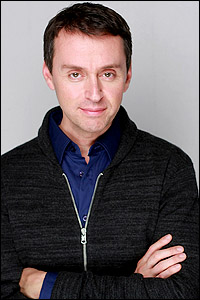 |
|
| Composer-lyricist Andrew Lippa |
"There was a wish list from the time I saw the show in Chicago," Zaks said. "It had to do with finding the story that would compel the audience to listen and want to turn the page with us. It was a huge challenge with this because, for all intents and purposes, the [source material for the] property existed as a series of stills — the cartoons, you know?"
Zaks said he wanted "to make a story that people would care about," that was distinct from previous TV or film treatments of the characters of Grandma, Lurch, Pugsley, Uncle Fester and the rest. The goal was "a story that made them human and a situation that they had to work through and…a conclusion that was satisfying."
Oken said there were "two good reviews and a mixed review" in Chicago, but the team, led by Zaks, identified that more work needed to be done — particularly in the show's first ten minutes. Between Chicago and Broadway, an entirely new opening number, "When You're an Addams," was written by Andrew Lippa and put into rehearsals. It better introduced the clan's personality (creepy, nocturnal, Latin-kissed) and world (we're in the ancestral graveyard on the grounds of the family's Victorian mansion located on the edge of Central Park).
SCARING UP BUSINESS Fed by the fuel of The Addams Family brand name (from years of history as New Yorker cartoons, a TV sitcom, an animated TV series and feature films) and goosed by the Broadway marquee names of Tony Award winners Neuwirth (Chicago, "Frasier") and Lane (The Producers, Zaks' Guys and Dolls and …Forum), the Broadway box office was booming by early 2010. An advance of $14 million had been amassed by the time of opening. In the months leading up to the April 8, 2010, opening night, some pundits and show geeks who hadn't seen the work in Chicago were guessing that The Addams Family, in spite of the reported change of artistic leadership, would probably be the season's Destination Show. Its chief competition seemed to be a starless rock 'n' roll musical, Memphis, about an interracial love affair between a white DJ and a black singer in the Jim Crow South.
Although Spider-Man Turn Off the Dark's producers famously ended up hyper-extending their preview period by six months a year later, in 2011, the option to add weeks or months of development — perhaps bumping its opening to the fall of 2010 — did not exist for The Addams Family.
"We had a commitment to a theatre," Oken said. "We had a $14 million advance…and we had stars under contract. What were we going to do? Nathan's run on Broadway may have been limited then to five months if we didn't open it on time…"
Oken said that Zaks' work on the show in early 2010 "did what it took to get us our 22 months on Broadway. He did an amazing job to give the company confidence and…improve what we had. It didn't seem like we were in that much trouble, but I think, in retrospect, expectations were very high so we were judged very harshly. Maybe if the expectations weren't so high, maybe we would've been judged a little less harshly and it wouldn't have turned into the thing it turned into, but we were a high-profile, big-budget musical with a big advance and we fired the director. You do that, you become a target."
The Addams Family became the favorite punching bag of New York theatre journalists and critics.
| |
 |
|
| Co-writer Rick Elice | ||
| photo by Aubrey Reuben |
Oken said, "We over-promised and under-delivered. That is jarring to people."
Zaks said, "I think we did a pretty great job of taking what we had and at least giving it a form and a structure — a beginning, middle and end — and it satisfied the audience. For me, the greatest thrill is at the end of the show. When people cheer and roar, it's a sound that I've heard a few times in my life, and it never happens out of charity. It's either earned or not."
By April 30, 2010, a few weeks after the Broadway opening of The Addams Family, the producers announced that the popular success would get a national tour, to launch in New Orleans, at the Mahalia Jackson Theater for the Performing Arts, in September 2011. (It's the first Broadway musical to take advantage of the incentive programs offered by Louisiana Entertainment, the state's entertainment industry development office.)
Memphis ended up winning the 2010 Tony Award for Best Musical. The Addams Family was nominated for two 2010 Tony Awards — for Best Score (Andrew Lippa) and Best Featured Actor in a Musical (Kevin Chamberlin, as Uncle Fester).
But the audience didn't care. The advance-paying crowds and tourist ticketbuyers swelled the Lunt-Fontanne Theatre, a cast album was recorded on the Decca Broadway label, and the Addams brand name and the stars prompted healthy ticket sales into March 2011, when Nathan Lane's contract ended. The week ending March 13, 2011, a year after previews had begun, saw a respectable gross of $721,811 and an average ticket price of $81. Tony winner Roger Rees replaced Lane. Later, Brooke Shields joined the company after Neuwirth's contract ended. (Rees and Shields continue on Broadway.)
An inevitable softening Broadway box office was on the minds of the producers and the creative team, but there was a pulse of life that kept them looking toward a more vibrant future: Since the opening, they had harbored another wish list of ideas for the show, to be explored for the creation of the national tour. It was decided that The Addams Family on the road would not be a clone of the Broadway brood.
| |
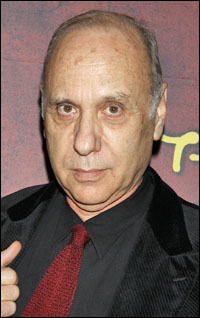 |
|
| Co-writer Marshall Brickman | ||
| photo by Joseph Marzullo/WENN |
"This opportunity is just such a blessing," Zaks said. "We were able, after a pretty healthy run in New York, to sit back and say, 'Alright. Come on. What is not happening? What needs to happen? How do we make it happen?' And, by then, the team had achieved a real rapport — a way of working. Everyone understood certainly what I expected and what was absolutely forbidden. That's very useful for a team because there's clarity."
"We're finishing our show," Oken said. "I think that what we did between Broadway and New Orleans is the equivalent to what our show might have done between Chicago and New York had it been healthy and functioning on all cylinders. This is what artists do to finish their show. And, if you're lucky, you do it before you get to Broadway, but we weren't lucky enough for that."
The Addams Family brand name (remember the TV show theme songs, and the films?) would seem to be catnip for road audiences who might not have read 2010 New York reviews. A cynic might look at regional audiences as somehow less discerning than New York's core audience. So, the cynical questions might be, why go to all the trouble to keep working on the show? Why make it better?
"Let me answer that," Zaks said. "Do you ever follow thoroughbred racehorses? I do. The great racehorses, even when they break down in the middle of the race, they keep running, they just don't know how to stop. I think it's not a bad analogy. We — meaning myself, Stuart and the creative team — once we had that meeting well into the run where we felt, 'Wow. We're okay,' and there was this calm and pride, the next step was, 'Okay, are we done? Because I'm not done…' "One of the happiest moments that I had on this was when I realized that Marshall and Rick and Andrew were ready to grab the bit and go. So, there's no rational logical reason. It's just about the frustration that it can be better."
Oken said, "It simply isn't over. Only Broadway was over. The road was not over. The rest of the world was not over. Publishing is not over. This is a work that will live on and it's the artists' work. They want their name on something that they're most proud of."
As Oken suggests, one factor in continuing to sharpen the show is a business concern: A better show might prompt more positive reviews, boosting the property's value in international markets like Sao Paulo, Brazil and Sydney, Australia, to say nothing of the future stock and amateur licensing life of the work. (There are also currently conversations about a London run. There's a recent precedent for a post-New York rewrite of a Broadway show — Shrek the Musical in London includes new material.)
Oken explained, "Our business model was to try to give birth to something that could have a longer life. You can't be in the big musical business today if you don't at least have your sights set on a show that travels and exists in more markets than Broadway, so we weren't done."
| |
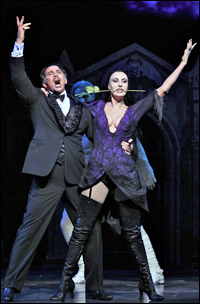 |
|
| Douglas Sills and Sara Gettelfinger on the Addams Family tour. | ||
| photo by Jeremy Daniel |
In the many post-Broadway conversations about making The Addams Family better, someone brought up the fact that there was no conflict between heads of household Morticia and Gomez Addams. Zaks said, "There was none. Truly, no. They acted as a team from beginning to end."
Oken added, "It also wasn't unintentional. It was the writers fearing that the contract between the audience and Gomez and Morticia required that couple to not have conflict between them. It's not like we didn't examine it."
On Broadway, the plot's conflict was the meeting of the "normal" Beinekes and the abnormal Addamses, who, in theory, would bond over the union of their children, Lucas and Wednesday, who had fallen in love.
When tour details were announced in recent months, the Playbill.com staff noticed that the plot description was different than the synopsis for the Broadway production. After several requests, Zaks and Oken agreed to sit down for this interview.
The new touring-show plot has Morticia and Gomez's relationship tested when Gomez (played by Tony nominee Douglas Sills) promises to keep Wednesday's secret that she intends to marry Lucas. She doesn't want mama Morticia (played by Sara Gettelfinger) messing it up. The foundation of the Addams marriage, we learn in a new song called "Secrets," is that there are absolutely no secrets between this husband and wife. Thus, Gomez is pulled in several directions (illustrated in a new song called "Trapped").
Zaks explained, "The cartoons, the other forms of the material, all suggest that they have been happy forever and a day and will continue as Morticia and Gomez. So, then, why is this night different from all others? Well, because tonight there is a wedge driven into the heart of that relationship."
Gomez also now has a solo in Act Two called "Not Today" that feeds into revised book material that underlines the show's central optimistic idea — "Let's Live Before We Die." The mix of "Let's Live" and the parental pas de deux, "Tango de Amor," creates an 11-o'clock climax for the main characters, and erases the memory of that squid song sung by a supporting character.
For the record, the songs "Where Did We Go Wrong?," the Addams parents' rumination on Wednesday's choice of a boyfriend, and Gomez's ode "Morticia," have been cut from the score. Those songs previously stopped the show, but not in a good way — they stopped the action. What The Addams Family now has is serious momentum.
Zaks said, "It's my job to make sure that the audience falls in love with them, so that when the shit hits the fan, if you will, we care about them, and when they overcome it and resolve it and restore their relationship to what it was, we are profoundly happy. To me, that's a story."
Oken said, "In New York…closest we got to [conflict and stakes] was Morticia being made to feel old."
Zaks said, "There was such an emphasis or concern about making it 'Addams-y' on the stage, and there's nothing wrong with that, but let's find that thing that allows the audience to relate to them as human beings — as adults."
| |
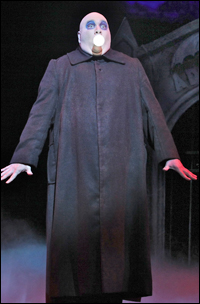 |
|
| Blake Hammond as Uncle Fester on tour. | ||
| photo by Jeremy Daniel |
One of the strengths of the original McDermott-Crouch production was its theatrical flights of fancy — its visual and character whimsy. Uncle Fester, with the aid of puppeteers masked in black, flies with the moon in a show-stopping (in a good way) sequence called "The Moon and Me."
"From the moment I saw it in Chicago, it was one of those 'How did they do that?' moments," Zaks said. "It goes right to your primitive love of magic — he's flying! I don't see any wires, and I purposely refuse to find out — my assistants did — how he did it. It wasn't until we got into the rehearsal room that I went, 'Wow.' And, it is magic. And, because it's so extraordinarily theatrical and consistent with this storyline, it exists as a delightful interlude. All great entertainment, I think, earns the right for an interlude, as long as it's not wildly off-subject. He [stated] his affection for the moon, and we know about it, and all of a sudden he shows up and sings a love song…"
The retained sequence got roars of approval on the opening night in The Big Easy.
So, there is room for whimsy? "Whimsical, it's gotta be," Zaks said. "It's not realistic. It's not naturalistic." Oken added that the Addams ancestors (the singing and dancing ensemble, in ashy-white costumes) "have taken a big step forward in this." They aid Wednesday in her goals, and they help Morticia illustrate her "Secrets" manifesto. He said, "I remember in developing the show, nobody wanted to deal with the ancestors, and I said it over and over again, 'Please, the ancestors!' Jerry did the first step moving from Chicago to New York, but now I think it's gone one step further and I think it's more satisfying."
| |
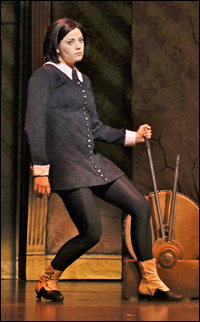 |
|
| Cortney Wolfson as Wednesday on tour. | ||
| photo by Jeremy Daniel |
Oken admitted that if ticket sales were stronger in New York, and if an extension beyond January 2012 had been possible, the new changes would have been implemented into the Broadway production. He said, "I think that we would have had to shut down for two or three days to tech. Let's say we knew exactly what had to be done: then I think they could've planned a tech to achieve that and we would have done it all in the rehearsal room while they were performing. I think there was a way to do it with missing two or three performances. We hoped we might make it, and even the actors in New York were up for doing it. Brooke wanted to do it. Roger wanted to do it. But, we couldn't work it out there."
Oken said that the Broadway production of The Addams Family is close to recouping its investment, but "I don't think we'll recoup while we're running. There is stock and amateur, there's four or five other productions, there's merchandise, there's so many things out there. Yes, it will recoup."
Oken and Zaks admitted that The Addams Family on tour is not yet frozen. New Orleans, Oken said, is "an opening, but we've still got more work to do."
The producers and creative team are looking to the Dec. 13-Jan. 1 Chicago engagement (returning to the show's birthplace) as the end point for revisions.
Oken said, "We're going to do a little more work and be finished by the end of the year." He added that they're speaking about this new process now in the hope that "people" — namely, audiences and critics — "will look at it fresh."
| |
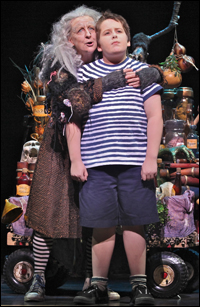 |
|
| Pippa Pearthree as Grandma and Patrick D. Kennedy as Pugsley on tour. | ||
| photo by Jeremy Daniel |
"I hope people will look at it and say, 'I'm not reviewing the New York show. I'm just going to look at this show and try to be honest about it,' the best they can."
Zaks said, "Andrew [Lippa] already has an assignment that involves changing the body of what is the 11-o'clock number. I'm going to go back to work in Schenectady and Buffalo...but by the time we get to Chicago, we should pretty much be what we are. We're very close. The way you can tell is that after the show when we all met backstage in the company manager's office [in New Orleans], no one had much to say, but no one wanted to leave, particularly. Everyone was there. Everyone was happy to see each other. It's a good thing. It suggests being 90-95 percent of the way there."
For more information about the national tour, visit theaddamsfamilymusical.com.
(Kenneth Jones is managing editor of Playbill.com. Follow him on Twitter @PlaybillKenneth.)










